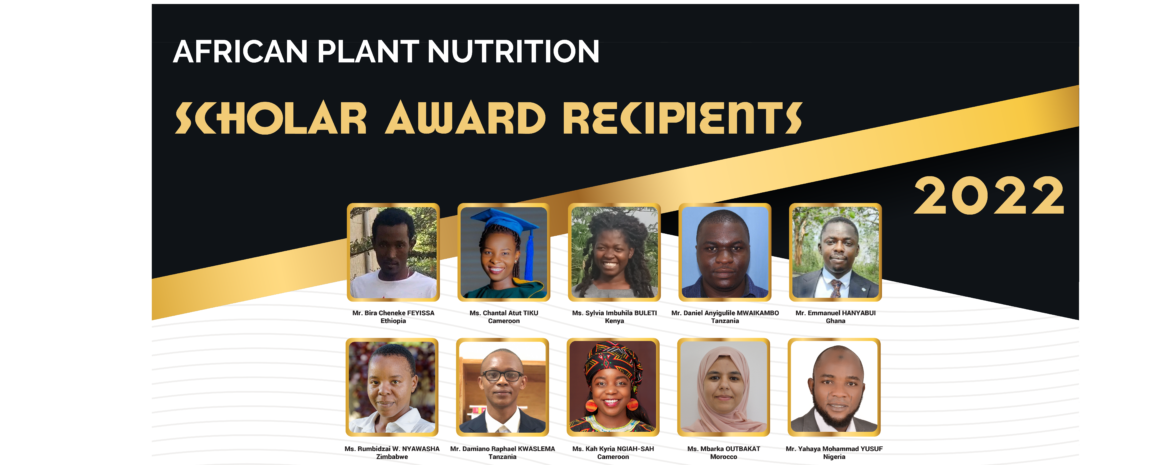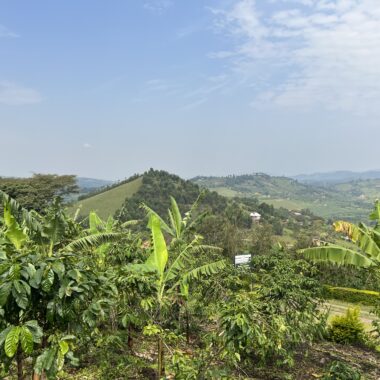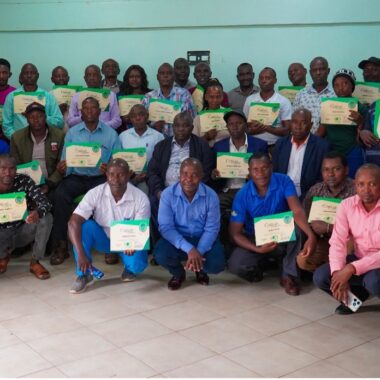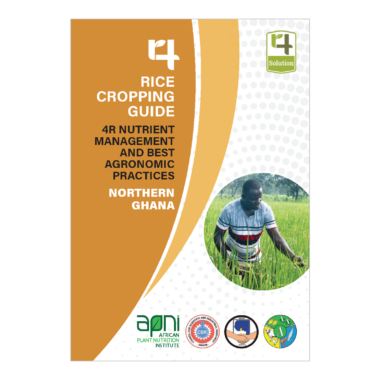Recipients Selected for the 2022 African Plant Nutrition Scholar Award
Benguérir, Morocco, August 24, 2022 – The African Plant Nutrition Institute (APNI) has announced the finalists of its annual African Plant Nutrition Scholar Award.
A total of ten African students were selected from advanced science programs focused on plant nutrition and the management of nutrients applied to crops in Africa. Each student receives $2,000 (U.S. Dollars).
“The academic institutions these young people represent, and their professors and advisers, can be proud of their student’s accomplishments,” said Dr. Kaushik Majumdar, APNI Director General. “Our selection committee adheres to rigorous guidelines in considering important aspects of each applicant’s academic and personal achievements.”
This scholarship is supported through APNI’s continued and valued partnership with Mohammed VI Polytechnic University (UM6P) and OCP Group (OCP S.A.). This initiative strives to encourage the brightest minds to focus on the critical target of continued advancement of the science of crop nutrition across Africa. This year’s recipients include:
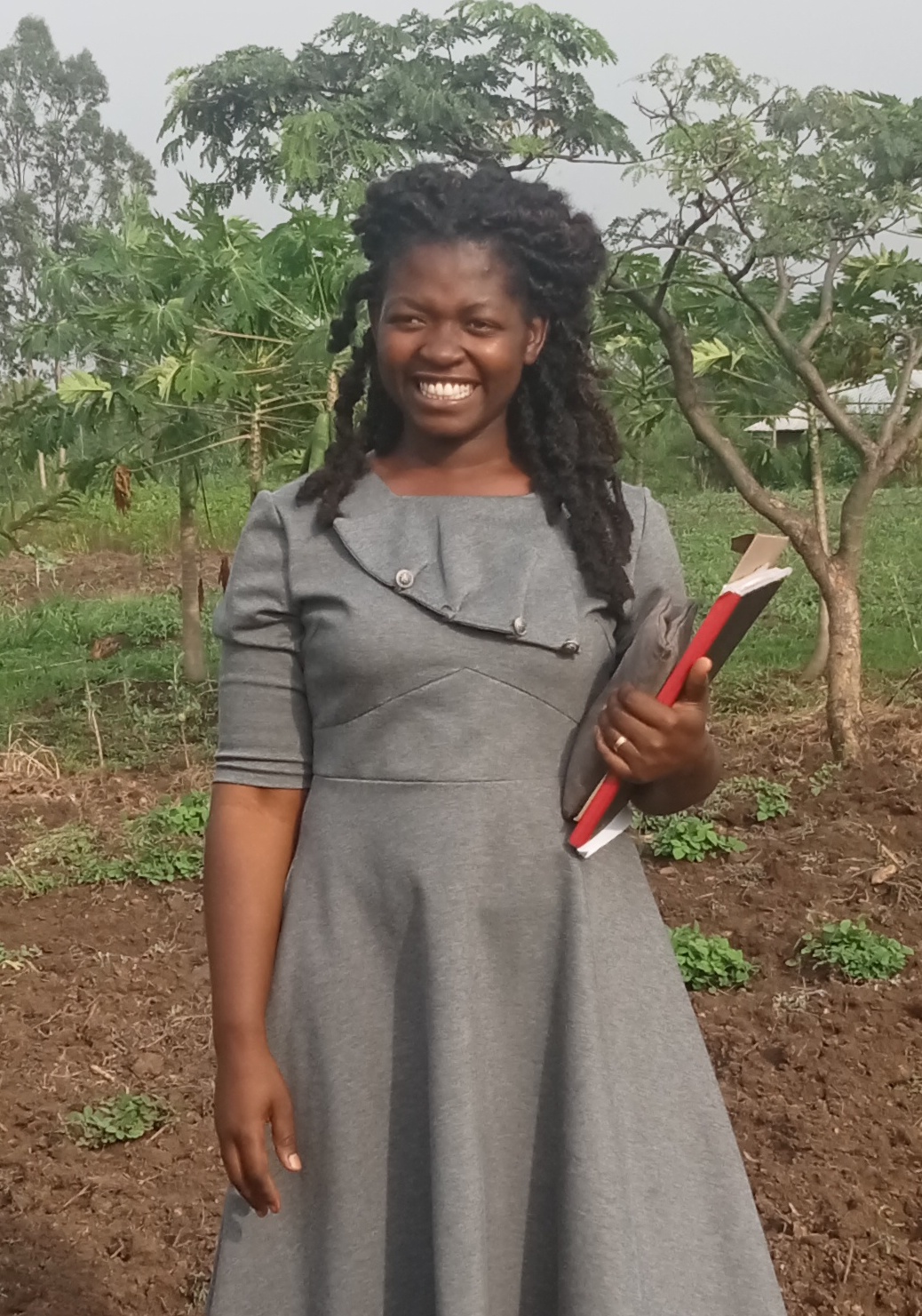 Ms. Sylvia Imbuhila BULETI — Kenya
Ms. Sylvia Imbuhila BULETI — Kenya
Doctorate Program, Jomo Kenyatta University of Agriculture and Technology, Juja, Kenya
Area of Study: Sustainable intensification of smallholder farming systems using push-pull as a template.
Crop yield gaps continue to widen in Sub-Saharan Africa hence the pressure to produce more. Push-pull cropping technology (an intercropping strategy for controlling agricultural pests by using repellent “push” plants and trap “pull” plants), is one of the crop intensification practices applied in smallholder cereal production systems to control insect pests (fall armyworm and stemborer) and striga weed, while improving soil health and providing fodder. However, the technology is currently limited to cereals and small plots.
Ms. Buleti’s study aims to identify opportunities for further intensification of push-pull technology in western Kenya, and to determine the effectiveness of select sustainable intensification practice on soil fertility, pest and weed management and crop productivity. Further intensification targets to diversify income and diets to enhance food security and improve farmers’ livelihoods. Additionally, it will contribute to smallholder policy development for the achievement of sustainable development goals such as zero hunger.
Ms. Buleti is a food security enthusiast, with passion for mentorship, research and training on soil fertility and crop health. Her current research on sustainable soil and pest management strategies enables her to participate in bridging the knowledge and technical gaps in the agricultural field in Kenya and globally. She is targeting work with research and training institutions as a way of capacity building so that she can contribute to the global agricultural community towards efforts to ensure global food security and environmental conservation.
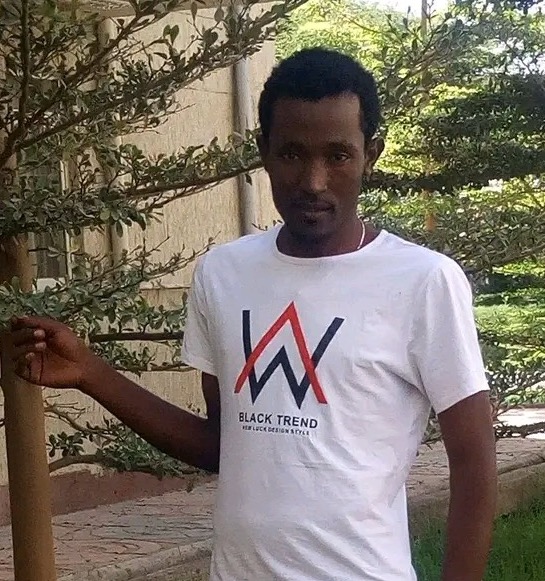 Mr. Bira Cheneke FEYISSA — Ethiopia
Mr. Bira Cheneke FEYISSA — Ethiopia
M.Sc. Program, College of Agriculture and Environmental Sciences, Haramaya University, Dire Dawa, Ethiopia
Area of Study: Effect of Parkland Ziziphus spina-christi L. and Mangifera indica L. on selected physicochemical properties of soil and sorghum yield in Sofi District, Harari Region, Ethiopia.
Mangifera indica and Ziziphus spina-christi trees are often planted along with sorghum and managed as parkland agroforestry in the Harari Region of Ethiopia. However, Information regarding the effects of these two tree species on soil health and sorghum yield is very scarce and not scientifically studied.
Mr. Feyissa’s research is intended to investigate the effects of parkland M. indica and Z. spina-christi trees on the selected physicochemical properties of soil and yield of sorghum within and outside the canopy of the tree and at varying soil depths in the region. The results will be useful to farmers and other stakeholders to give insight into the effects of parkland trees on soil fertility and sorghum yield in their farmlands. The information can also help in designing sustainable land use that could enhance the productivity of crops while maintaining and improving the resource base.
Mr. Feyissa hopes to achieve his future aims of becoming a professional agriculture and natural resources researcher working to help improve farmer livelihoods and resilience to climate change in Ethiopia and Africa.
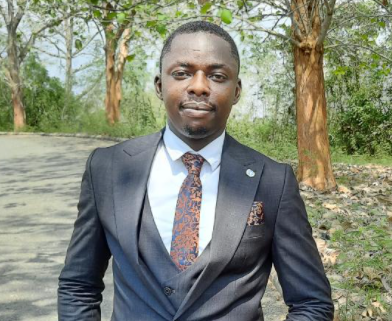 Mr. Emmanuel HANYABUI – Ghana
Mr. Emmanuel HANYABUI – Ghana
Doctorate Program, Department of Soil Science, University of Cape Coast, Cape Coast, Ghana
Area of Study: Yield, nutritional quality of pineapple and soil ecosystems delivery in low nutrient soil amended with inorganic and organic fertilizers.
Mr. Hanyabui research is aimed at examining the effect of inorganic and organic amendment on yield, and nutritional quality of pineapple, and soil ecosystems services in low nutrient, Ghanaian soils.
Current strategies to increase and maintain pineapple yield levels are characterized by high mineral fertilizer application, low organic matter input, and high applications of pesticides and herbicides. However, there is limited information on the responses of pineapple to inorganic NPK fertilizers in terms of pineapple growth, fruit yield, and nutritional quality.
The objective of Emmanuel’s research is to use innovative precision agriculture tools to determine the effect of tailored or site-specific fertilizer applications, especially phosphorus (P), to improve pineapple yield and nutritional quality. This project will help to predict variable inorganic NPK fertilizer application rates for profitable and ecologically sensible pineapple production. It is expected that the implementation of site-specific fertilizer application will increase pineapple yield, nutritional quality, and farmers’ incomes.
Emmanuel’s career goal is to become a soil fertility management expert (lecturer and researcher) of international repute, serving as a positive change agent for soil management for sustainable agricultural development and preservation of environmental sanitation. He wishes to collaborate with renowned and experienced soil and environmental scientists across the globe. He also aspires to collaborate with experts in other agriculture-related disciplines to carry out multidisciplinary projects that will ensure resilient and profitable agricultural production systems and enhance food security for the burgeoning African population.
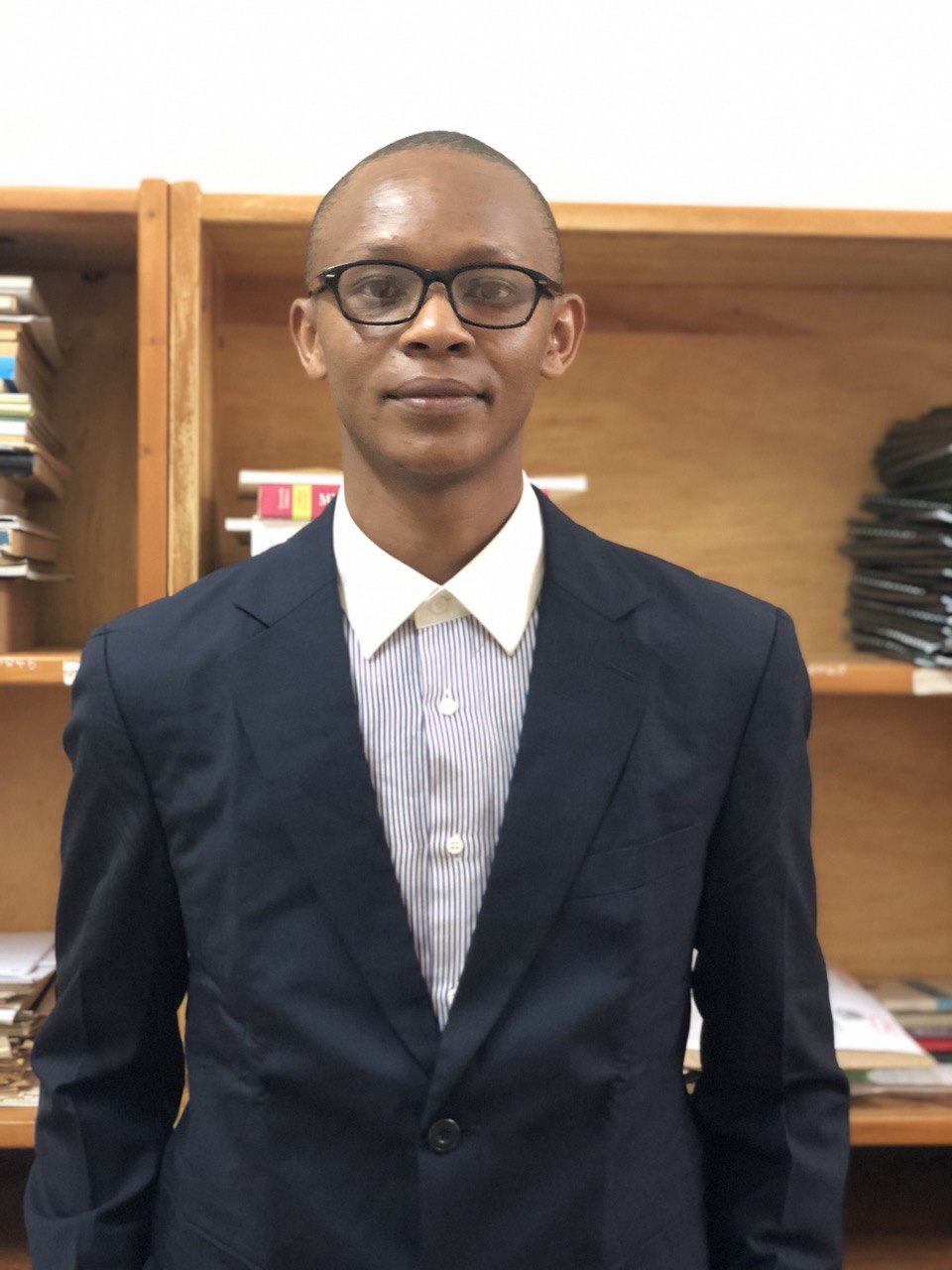 Mr. Damiano Raphael KWASLEMA – Tanzania
Mr. Damiano Raphael KWASLEMA – Tanzania
M.Sc. Program, Sokoine University of Agriculture, Morogoro, Tanzania
Area of Study: Influence of organic carbon and nitrogen sources on bacterial ability to solubilize rock phosphate and enhance plant growth in acidic and calcareous soils.
Mr. Kwaslema’s research is aimed at developing a cost-effective and eco-friendly formulation of phosphatic-biofertilizer for enhancing soil phosphorus (P) availability and plant growth in both the acidic and calcareous soils of Tanzania.
To achieve this, Damiano is working to isolate and characterize P-solubilizing microorganisms (PSMs) from acidic and calcareous soils of Tanzania, examine the influence of the local organic carbon (C) sources and fertilizer-grade nitrogen (N) sources for enhancing Minjingu Rock Phosphate solubilization by PSMs, and evaluate the ability of PSM-Rock phosphate formulation to enhance P availability and maize yields on these acidic and calcareous soils. This study addresses the current knowledge gap for the potential of PSMs and phosphatic biofertilizers sourced from local P reserves and organic wastes.
In Tanzania, the productivity of crops such as maize is quite very low at 1.6 t/ha. With respect to increasing maize consumption in the country and the potential of Tanzania to be a breadbasket for the whole East African region, maize production needs to be boosted. This can be achieved by improving soil fertility through fertilization. It is therefore imperative to locally produce cost-effective and eco-friendly biofertilizers that could enhance crop productivity by smallholder farmers who might rarely afford high priced fertilizers. The conceived biofertilizer could achieve this by improving soil nutrient availability, especially P, which is limiting in soils due to the prevalence of soils with high P-sorption capacities.
Damiano’s immediate professional aim is to earn his M.Sc. with high academic standing. He aspires to contribute to sustainable development goals as an innovative researcher, consultant, and leader in soil science.
 Ms. Kah Kyria Ngiah-Sah – Cameroon
Ms. Kah Kyria Ngiah-Sah – Cameroon
Doctorate Program, University for Development Studies, Tamale, Ghana
Area of Study: Effect of different levels of fertigation on yield and quality of vegetables in protected copping in the drylands of Cameroon.
Ms. Ngiah-Sah’s work is focused on developing strategies to better manage the production of high yield and superior quality vegetable crops with improved water and nutrient use efficiency through micro and macronutrient application regimes. She is studying irrigation and drainage engineering at one of the African Centers for Excellence, the West African Center for Water, Irrigation and Sustainable Agriculture (WACWISA), established by the University for Development Studies. Her research will be conducted in gutter-connected greenhouses located in three different agro-ecological zones of Cameroon.
The impact of the study will add knowledge of country-specific yield, quality, and physiological analysis to extend understanding and improvement of greenhouse production following resilient strategies. She also sees this research as a significant contribution to achieving Sustainable Development Goals 1, 2, 3, 5, 13, and 15.
Kah Kyria’s current goal is to complete her Ph.D. thesis with publications in high impact journals and to ensure that these results benefit farmers and researchers in improving soil fertility, nutrient management in vegetable production, and subsequently precision farming. She looks forward to working with an international research institute that will allow her to exercise her expertise and experiences in finding sustainable solutions to problems plaguing the vegetable sector. Her long-term goals are to become a leading researcher devoted to working closely with farmers, equipping them with techniques for maximizing crop yield.
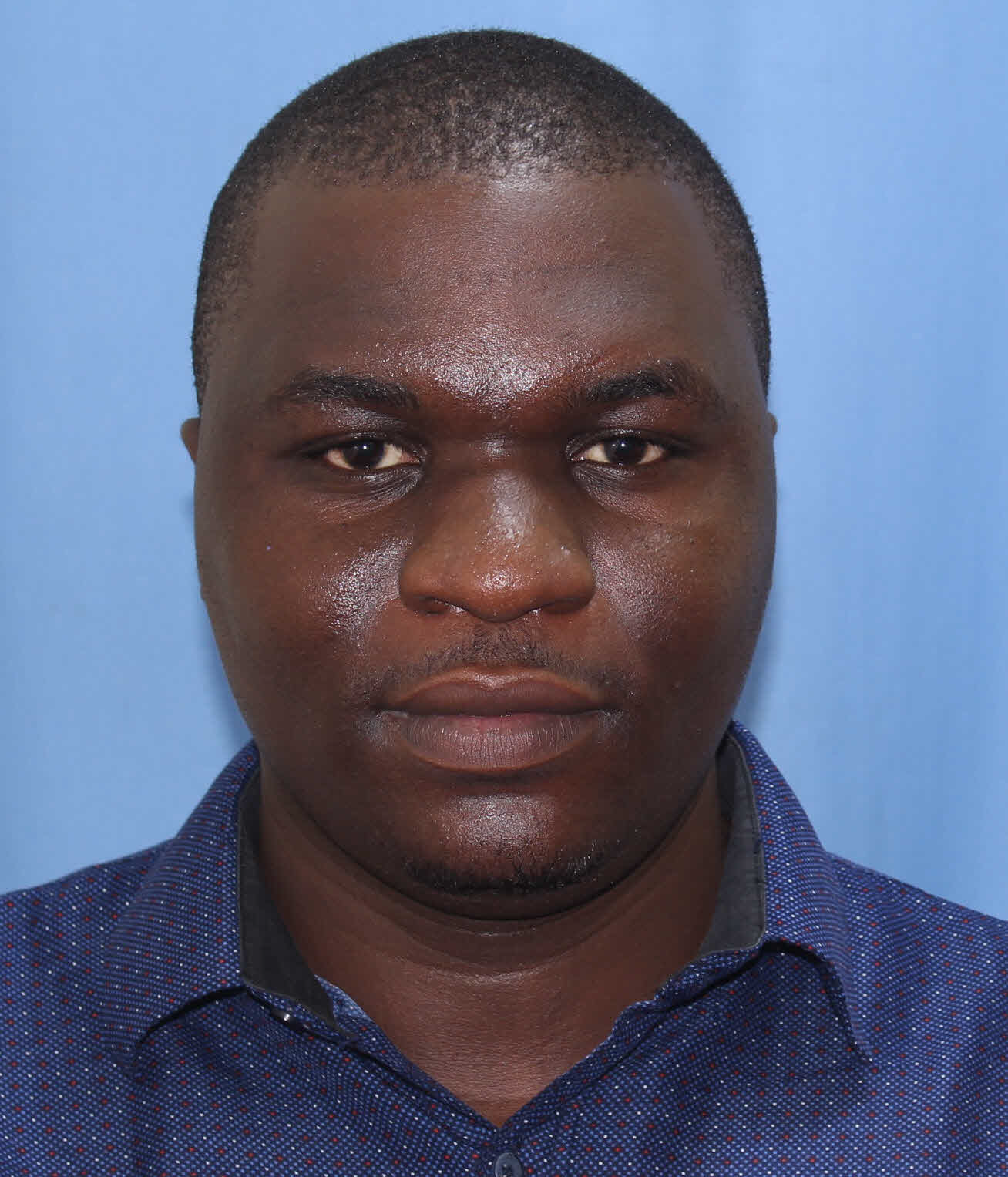 Mr. Daniel Anyigulile MWAIKAMBO – Tanzania
Mr. Daniel Anyigulile MWAIKAMBO – Tanzania
M.Sc. Program, Applied Botany, University of Dar es Salam, Tanzania.
Area of Study: Assessment of the effects of soil physicochemical characteristics on fruit nutritional quality of local avocado germplasm grown in the Mbozi district.
Mr. Mwaikambo’s study covers two objectives. First, to profile the nutritional quality of the local avocado fruits grown in the Mbozi district; the second is to assess the influence of soil physicochemical properties [soil texture, pH, CEC, EC, organic carbon (C), total nitrogen (N), available phosphorus (P), calcium (Ca), magnesium (Mg), and potassium (K)] on the nutritional quality of local avocado fruits.
Profiling of nutritional quality of local avocado fruits will improve the crop value to the international market. Also, the study will help to identify the local avocado germplasms with high nutritional value, to be good sources of scions for grafting. Daniel’s work will also help to identify key soil physicochemical properties that affect the nutritional quality of the local avocado fruits and hence suggest the application of appropriate agronomic practices for the improvement of a particular nutritional quality. The findings will provide the benchmark database for further research on avocados found in Tanzania.
Daniel’s goal is to become a plant nutrition researcher, especially for local crops. This includes research that identifies the best mix of agronomic practices most able to improve productivity, nutrition, and postharvest shelf life of local fruits and vegetables. Current marketing efforts are hindered by short shelf life, a poor nutritional profile, or low nutritional quality, which can be solved by the use of appropriate plant nutrition strategies.
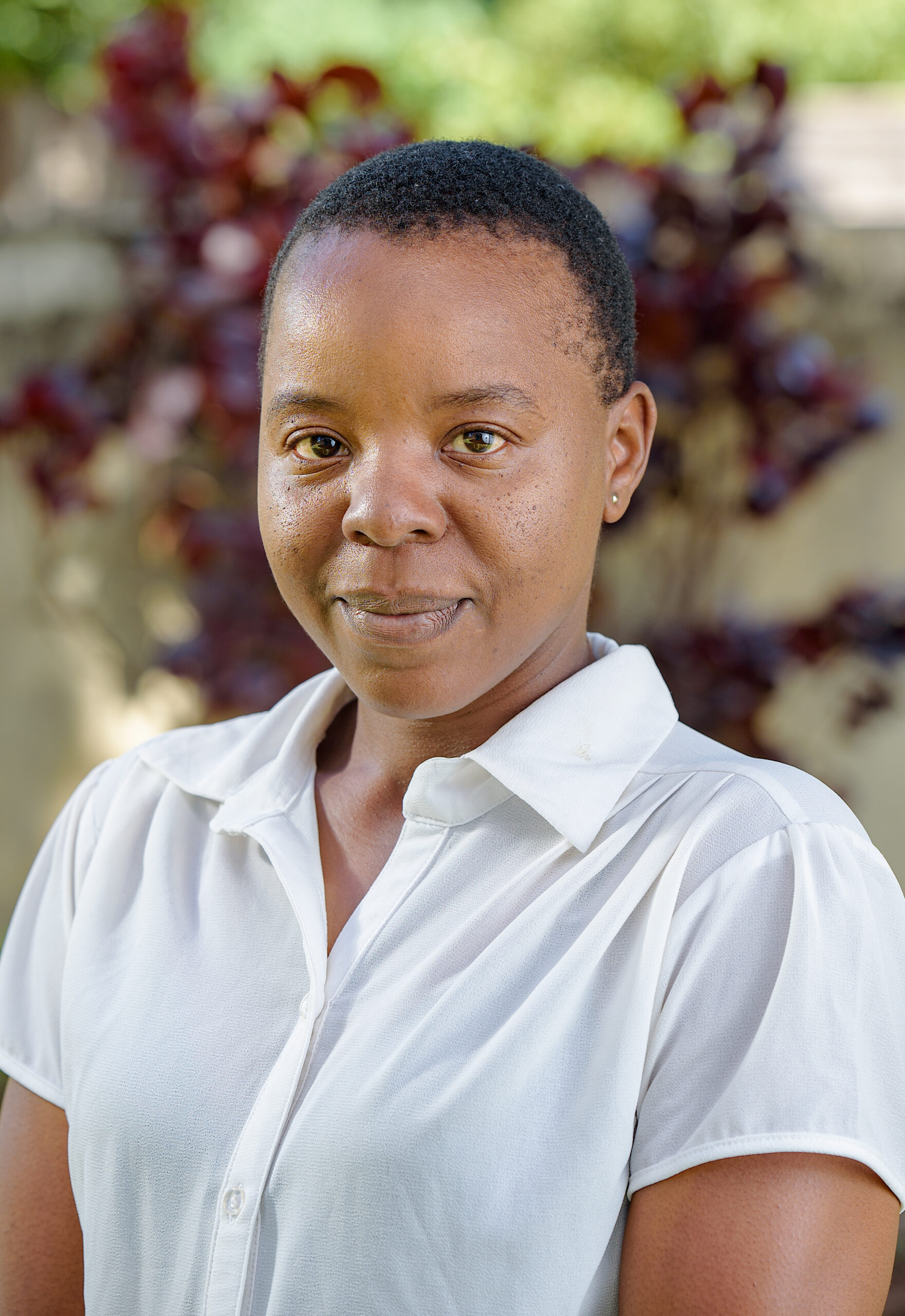 Ms. Rumbidzai W. NYAWASHA – Zimbabwe
Ms. Rumbidzai W. NYAWASHA – Zimbabwe
Doctorate Program, Department of Plant Production Sciences and Technologies, University of Zimbabwe, Mt Pleasant, Harare, Zimbabwe
Area of Study: Soil organic carbon sequestration across scales in a subhumid region of Zimbabwe.
Ms. Nyawasha’s main objective is to understand the biophysical and socio-economic drivers of soil organic carbon (SOC) sequestration at three smaller holder farming scales (plot, farm, and village) in Murewa district, Zimbabwe.
Building on previous research that has shown the important role resource endowment plays in influencing decision making on resource use and nutrient dynamics at plot and farm level; this study will use land use and land management information from local farmers to understand how long-term changes in land use patterns and management affect SOC content in the area. A large-scale soil sampling exercise will be carried out from croplands and common grazing lands with the aim of creating maps of carbon and nutrient flows from croplands to common grazing lands – this will provide a baseline of the current distribution. Soil sampling will be augmented by yield surveys to better understand how crop yield relates to SOC stocks and ultimately to soil fertility. This information, combined with farm system characterizations and simulation models will enable us to evaluate alternative systems that create synergies and trade-offs between crop productivity and soil carbon sequestration.
Rumbidzai intends to continue with a career in research with particular emphasis on work that brings her closer to smallholder farmers in rural Africa – for whom farming is not just a livelihood option but a lifestyle. She strongly feels that they require more tailored information to improve soil productivity and better their farming. She hopes to work with research institutions whose focus is on promoting sustainable agriculture solutions for smallholder farmers – with emphasis on taking science from the scientist’s desk to the farmer’s little notebook.
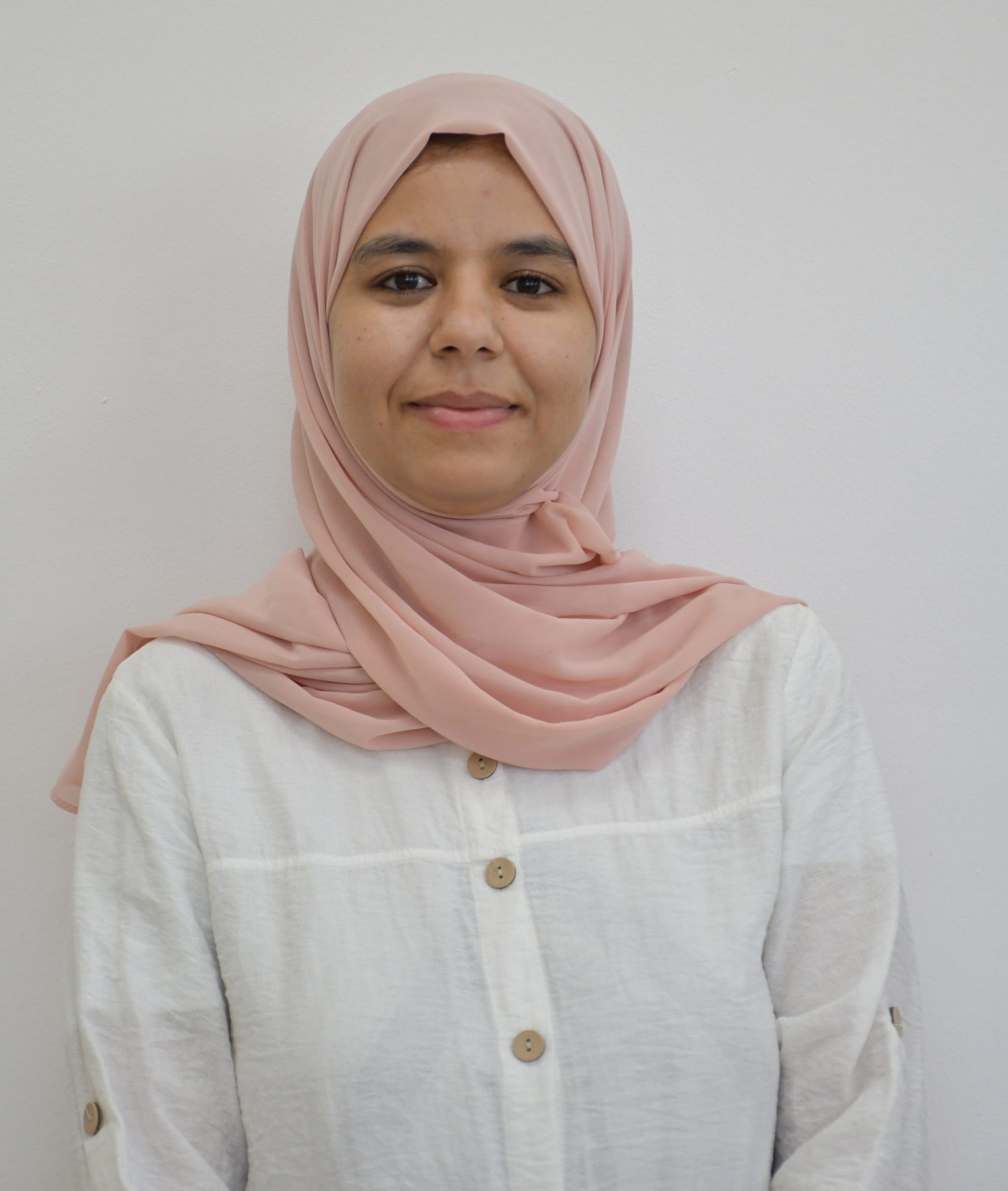 Ms. Mbarka OUTBAKAT – Morocco
Ms. Mbarka OUTBAKAT – Morocco
Doctorate Program, Agricultural Innovation and Technology Transfer Center (AITTC), Mohammed VI Polytechnic University (UM6P), Benguérir, Morocco
Area of Study: Valorization of phosphogypsum in agriculture as an amendment and a fertilizer.
Salinity is one of the most critical challenges facing food security, especially in arid and semi-arid areas. The total saline area is about 1 billion ha, with 63% located in Africa. Phosphogypsum (PG) is widely used for saline soil reclamation. Ms. Outbakat’s research has installed pot trials at the UM6P experimental farm in Benguérir to evaluate the effect of PG on crops and soils affected by salinity and to investigate the safety of its application based on heavy metals and radioactive elements contents in the water-soil-plant system.
Low soil fertility also severely threatens food security, particularly in Africa. Using low-cost fertilizers, such as PG, would be a promising alternative to increase agricultural productivity. PG showed positive effects in crop fertilization because it contains several nutrients [calcium (Ca), sulfur (S), and phosphorus (P)] that are vital for crop growth. A field trial has also been installed at the UM6P experimental farm to evaluate the effect of PG as a low-cost fertilizer and investigate its application’s safety based on heavy metals and radioactive elements contents in the soil-plant system.
Mbarka is working as part of a research team contributing to overcoming agricultural challenges (salinity, irrigation, and plant nutrition efficiency …), mainly in Morocco and Africa. She is also interested in improving the “circular economy”, which aims to recycle waste into new resources to build a sustainable system.
 Ms. Chantal Atut TIKU – Cameroon
Ms. Chantal Atut TIKU – Cameroon
Doctorate Program, School of Engineering and Department of Agricultural Engineering, University for Development Studies, Tamale, Ghana
Area of Study: Effect of soil moisture and potassium inputs on yam planting material for seed yam production in Tolon district of Ghana.
Ms. Tiku’s study seeks to address the nutritional-related problems in high quality seed yam production by assessing the efficiency of nutrient acquisition from organic and inorganic materials at different levels of potassium (K) content, and the effect on seed yam tuber yield, seed quality, and soil. Results will identify the yam variety most suitable for the uptake and efficient usage of K and the fertilizer recommendation that both maximizes yields and restore soil nutrients. This fertilizer will be recommended to seed yams farmers as well as the most responsive yam variety. The findings of this research will enhance the production of quality seed yam in their required quantities throughout the yam belt of west Africa and beyond.
Chantal is passionate about improving the food security situation in Cameroon. She is seeking to improve the production of quality seed yam in good quantities by seed yam farmers using rapid seed yam multiplication methods. Conduct cutting-edge research to understand how various nutrient inputs affect both seed and ware yam production.
Becoming a leading yam researcher in Cameroon will not only enhance the production and output of the valuable tuber in Cameroon but will improve the food security situation of Central and West Africa and Africa as a whole. After the completion of her Ph.D. program, Chantal plans to join the community of soil, plant nutrition, and irrigation researchers in Cameroon, to conduct research and influence policies to favor greater productivity.
 Mr. Yahaya Mohammad YUSUF – Nigeria
Mr. Yahaya Mohammad YUSUF – Nigeria
M.Sc. Program, Mohammed VI Polytechnic University (UM6P), Benguérir, Morocco
Area of Study: A comparison of soil phosphorus extraction methods for soil test-based P fertilizer recommendation for tomato production in Kano State, Nigeria.
Mr. Yusuf’s research is focused on developing a soil test-based phosphorus (P) fertilizer recommendation model to increase tomato production in Nigeria. Nigeria is the second-largest tomato producer in Africa, with an annual production of about 2.3 million metric tons (MMT). Since this does not meet Africa’s annual demand currently estimated at about 3.0 MMT, there is a need to increase local tomato production to bridge this gap.
One of the major constraints to improving crop production in Nigeria is low soil fertility. Phosphorus, which plays essential roles in tomato production, is the second most growth-limiting nutrient after nitrogen (N). However, research on soil test-based P fertilizer recommendations are at preliminary stages in Nigeria.
Yahaya’s objective is to evaluate different P extraction methods for sustainable and economic use of P fertilizers and to develop a critical P concentration for fertilizer recommendation models for tomato production. His study will present the most effective method of estimating soil available P from which a mathematical model for integrating soil test P, P critical level, and P requirement factor for P fertilizer recommendation will be developed for increasing tomato production in Nigeria.
Upon completion of this M.Sc. degree, Yahaya will be looking for an opportunity that will allow him to pursue a Ph.D. and to develop his expertise and skills in my academic career. His long-term career goal is to be an Africa-based research scientist specializing in research specifically in soil fertility and plant nutrition.

